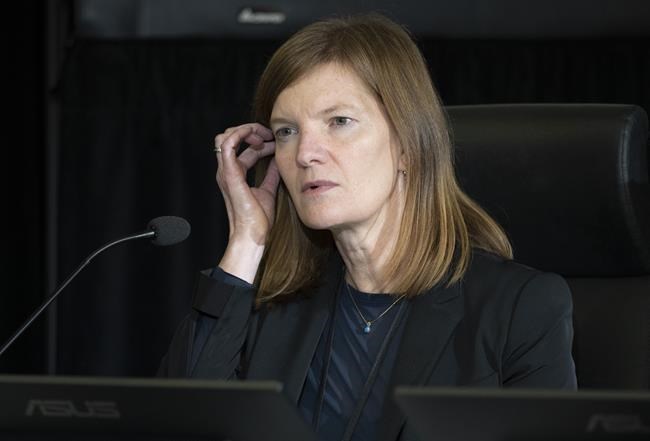OTTAWA — The "Freedom Convoy" protests that took over downtown Ottawa last winter and inspired several border blockades caused serious concerns about Canada's international reputation and its economic security, senior Canadian officials say.Â
Their testimony Monday evening at the Public Order Emergency Commission, along with new documentary evidence, suggests diplomats were getting anxious questions and forceful pleas from United States officials worried about the halt of trade by protesters blocking key border crossings.
The commission is investigating the federal government's ultimate use of extraordinary emergency powers in response to the protests against COVID-19 restrictions.Â
"We were actually very concerned about the economic security of this country," said Cindy Termorshuizen, an associate deputy minister of foreign affairs at Global Affairs Canada.Â
She added that being a reliable trading and investment partner internationally means being a country where the rule of law is enforced. "Clearly, what we were seeing during this period was a very significant defiance of the law."
An email from Ralph Goodale, the former Liberal minister and current high commissioner in the United Kingdom, that was entered into evidence spells out his bird's-eye-view concerns on Feb. 13, the day before the federal emergency declaration. Â
"Two consequences need to be watched very carefully — the negative economic and reputational impacts from trade disruptions, and the possible impression that Canadian police, security and intelligence systems are incapable of responding effectively to blatant, large-scale, illegal conduct," Goodale wrote to colleagues.
A summary of interviews Termorshuizen and other high-level officials gave to the commission, which was presented into evidence on Monday, said U.S. officials made it clear to Canadian counterparts that border closures in Windsor, Ont., and Coutts, Alta., were a major issue.
"They made clear that the border closure was a major issue with consequences for the transportation of essential goods and for the automotive sector. One such official pointed out that the blockades were undermining Canada’s efforts to promote itself as a dependable trading partner for the U.S.," the summary says.Â
"Another emphasized how the blockades were ultimately hurting working, middle-class Canadians and Americans."
The summary says Termorshuizen felt that the government's ultimate use of an emergency declaration to clear protests addressed the concerns and helped assuage international doubts about Canada's reliability.Â
Martin Loken, the then-deputy head of mission for Canada in Washington, D.C., stated that "he was able to point to the Emergencies Act as evidence that Canada was taking the issue seriously," the summary says. It also notes that the decision to invoke the special powers did not attract criticism stateside.Â
The federal government invoked the act on Feb. 14, nearly three weeks into demonstrations in Ottawa and the day after police moved to clear a six-day blockade at the Ambassador Bridge in Windsor.
Its justification for the emergency declaration, which gave police and financial institutions extraordinary powers in an attempt to end the demonstrations, included Canada's economic security and its ability to conduct international trade and keep supply chains going.Â
That decision came three days after Prime Minister Justin Trudeau spoke with U.S. President Joe Biden. Termorshuizen said the conversation touched on U.S. donations to the Canadian protesters and the presence of American phone numbers in a flood of phone calls disrupting Ottawa's emergency services line during the convoy. A readout from the White House said the prime minister "promised quick action in enforcing the law."Â
Canada had been receiving a steady stream of alarmed messages from the United States.Â
On Feb. 9, an email from Loken to Trudeau's national security adviser, Jody Thomas, said that a U.S. official at the American Embassy in Ottawa conveyed "a high degree of anxiety in Washington about lack of movement (pun intended) on the truckers" and "a sense Canada is not devoting enough resources — human or otherwise."
The same day, Trudeau was echoing concerns on the phone with Ontario Premier Doug Ford, according to a readout of their conversation submitted into evidence last week: "At a time we’re trying to draw in investments, a whole bunch of people are looking at this and saying we can’t even clear up a protest on a bridge?"
And documents show that Joe Comartin, the country's consul general in Detroit, was in communication with various U.S. political, business and union representatives worried about the impact on trade. Some of them, including Michigan Gov. Gretchen Whitmer, were making public statements urging action.Â
Comartin testified that the blockade had hit at "a really crucial time."Â
"We're going to build a whole new supply chain in order to have the electric vehicles come online and Canada has the potential to play a great role in that. That was jeopardized by this blockade," he said.Â
"It was just a very difficult time to be able to convince our U.S. partners that we were serious about being their partner on an ongoing basis, as we have historically."
Earlier on Monday, Dominic Rochon, a senior assistant deputy minister with the national and cybersecurity branch of the government, told the inquiry that the U.S. Department of Homeland Security was also concerned about the blockades.
Rochon said the Public Safety Department received several calls from U.S. security experts that mentioned concerns about how Canada was coping with the protests and "whether or not it could manifest itself on their side of the border."
Termorshuizen said her department was keeping a keen eye on demonstrations that cropped up elsewhere in the world and the use of the Canadian flag. "It was being used frankly as a symbol of defiance of the law and we were quite concerned about those reputational impacts."
She said that during the demonstrations in Ottawa, there were also concerns about being able to uphold Canada's legal obligations to foreign diplomats, some of whom were reporting feeling unsafe downtown.Â
This report by The Canadian Press was first published Nov. 14, 2022.Â
Marie-Danielle Smith, The Canadian Press




